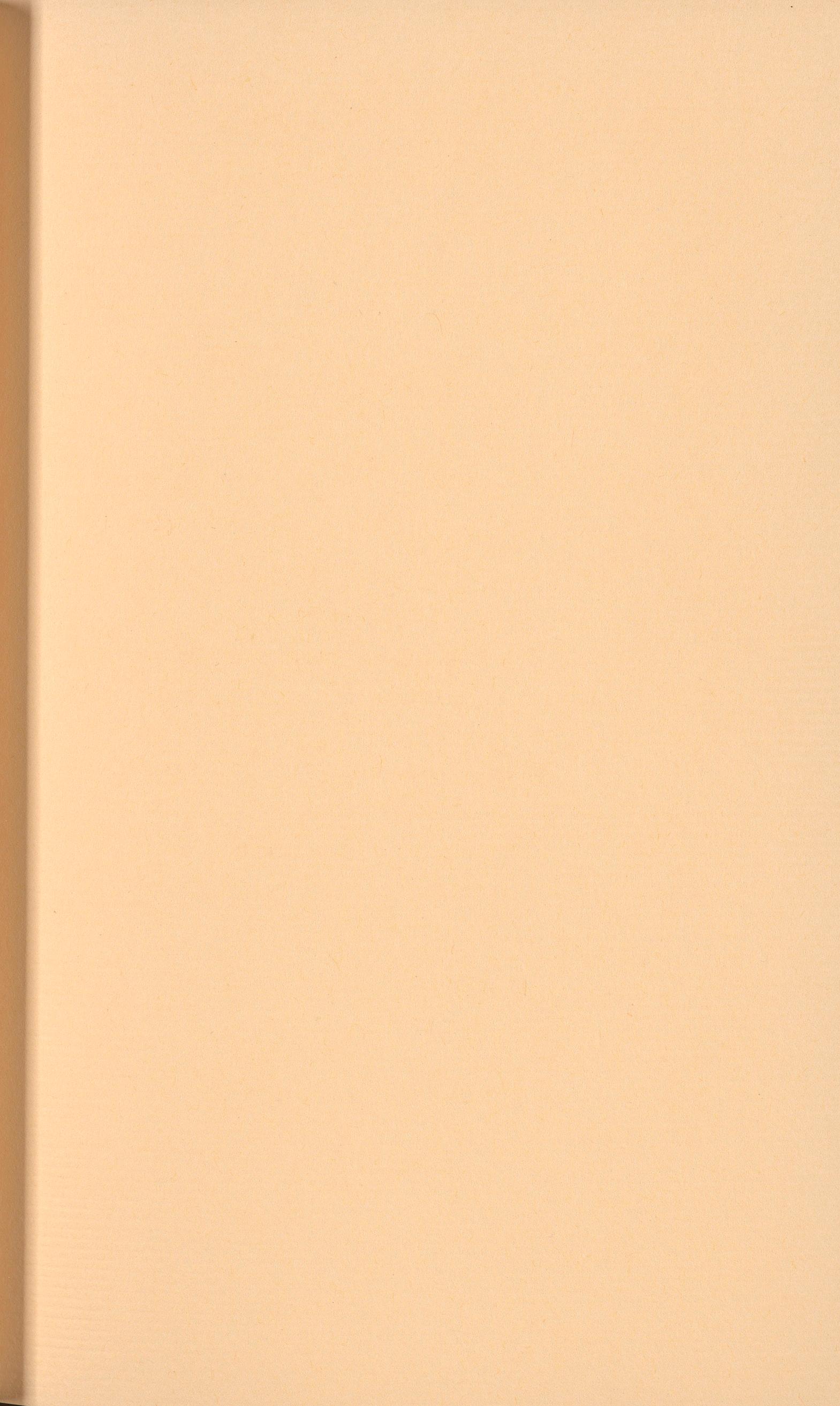




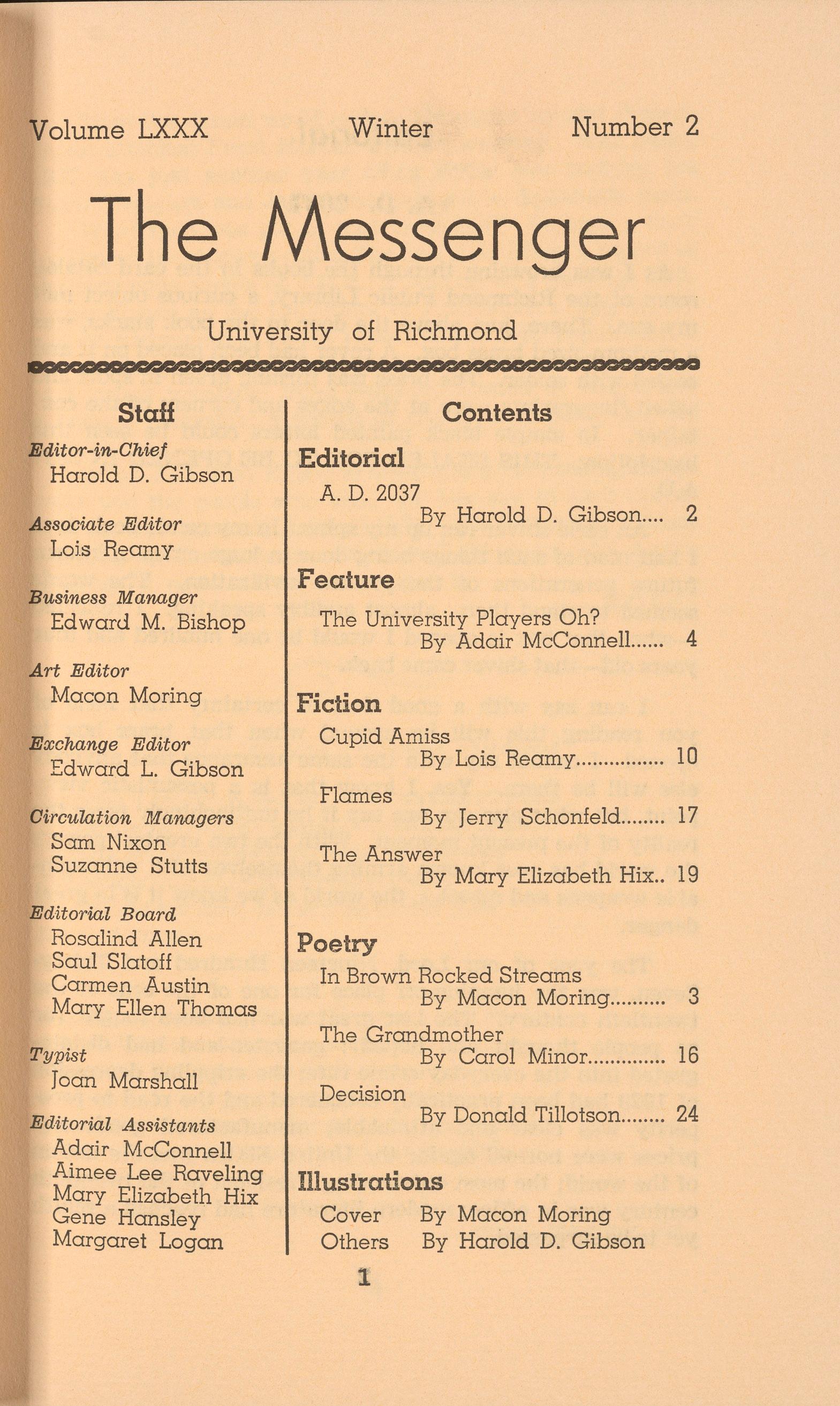
Editor-in-Chief
Harold D. Gibson
Associate Editor Lois Reamy
Business Manager
Ed ward M. Bishop
Art Editor
Macon Moring
Exchange Editor
Edward L. Gibson
Circulation Managers
Sam Nixon
Suzanne Stutts
Ed i to r ial Board
Rosalind Allen
Saul Slatoff
Carmen Austin
Mary Ellen Thomas
Ty pist
Joan Marshall
Ed i torial Assistants
Adair McConnell
Aimee Lee Raveling
Mary Elizabeth Hix
Gene Hansley
Margaret Logan
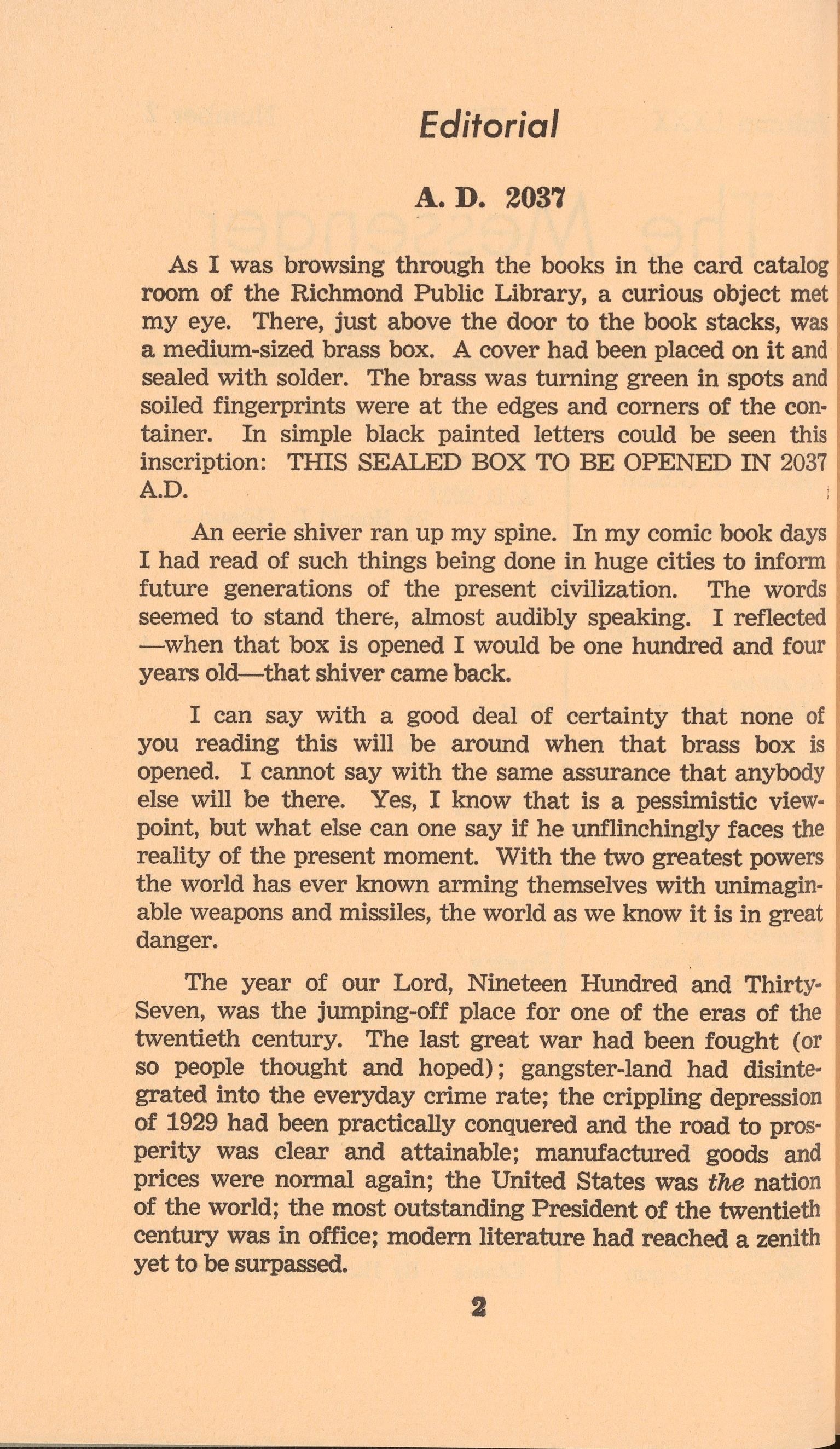
As I was browsing through the books in the card catalog room of the Richmond Public Library, a curious object met my eye. There, just above the door to the book stacks, was a medium-sized brass box. A cover had been placed on it and sealed with solder. The brass was turning green in spots and soiled fingerprints were at the edges and corners of the container. In simple black painted letters could be seen this inscription: THIS SEALED BOX TO BE OPENED IN 2037 A.D.
An eerie shiver ran up my spine. In my comic book days I had read of such things being done in huge cities to inform future generations of the present civilization. The words seemed to stand there:, almost audibly speaking. I reflected -when that box is opened I would be one hundred and four years old-that shiver came back.
I can say with a good deal of certainty that none of you reading this will be around when that brass box is opened. I cannot say with the same assurance that anybody else will be there. Yes, I know that is a pessimistic viewpoint, but what else can one say if he unflinchingly faces the reality of the present moment. With the two greatest powers the world has ever known arming themselves with unimaginable weapons and missiles, the world as we know it is in great danger.
The year of our Lord, Nineteen Hundred and ThirtySeven, was the jumping-off place for one of the eras of the twentieth century. The last great war had been fought {or so people thought and hoped); gangster-land had disintegrated into the everyday crime rate; the crippling depression of 1929 had been practically conquered and the road to pros· perity was clear and attainable; manufactured goods and prices were normal again; the United States was the nation of the world; the most outstanding President of the twentieth century was in office; modern literature had reached a zenith yet to be surpassed.
Then the dream world ended. Germany invaded Poland; Japan attacked Pearl Harbor without warning. War again. 1937 was just another year when Hitler was training his Storm Troopers and Japan was engaged in diplomatic ruses. What then was put in that brass box? Perhaps a book by Ernest Hemingway called The Sun Also Rises; a record of the accomplishments of F.D.R.; a bulletin of a growing institution known as the University of Richmond; a map of the city of Richmond; a census record of the 1930 population; a few newspapers to show the prosperity of the times; a copy of a young magazine titled Saturday Review of Literature; a fashion magazine; a record of church attendance for the year.
When A.D. 2037 finally arrives, and it isn't too far away, what will the people who open the box say to each other? "Oh, for the good old days of 1937." Or will it be, "Thank goodness for our modern civilization?" There might not even be a box to open nor anyone to open it.
-H.D.G.
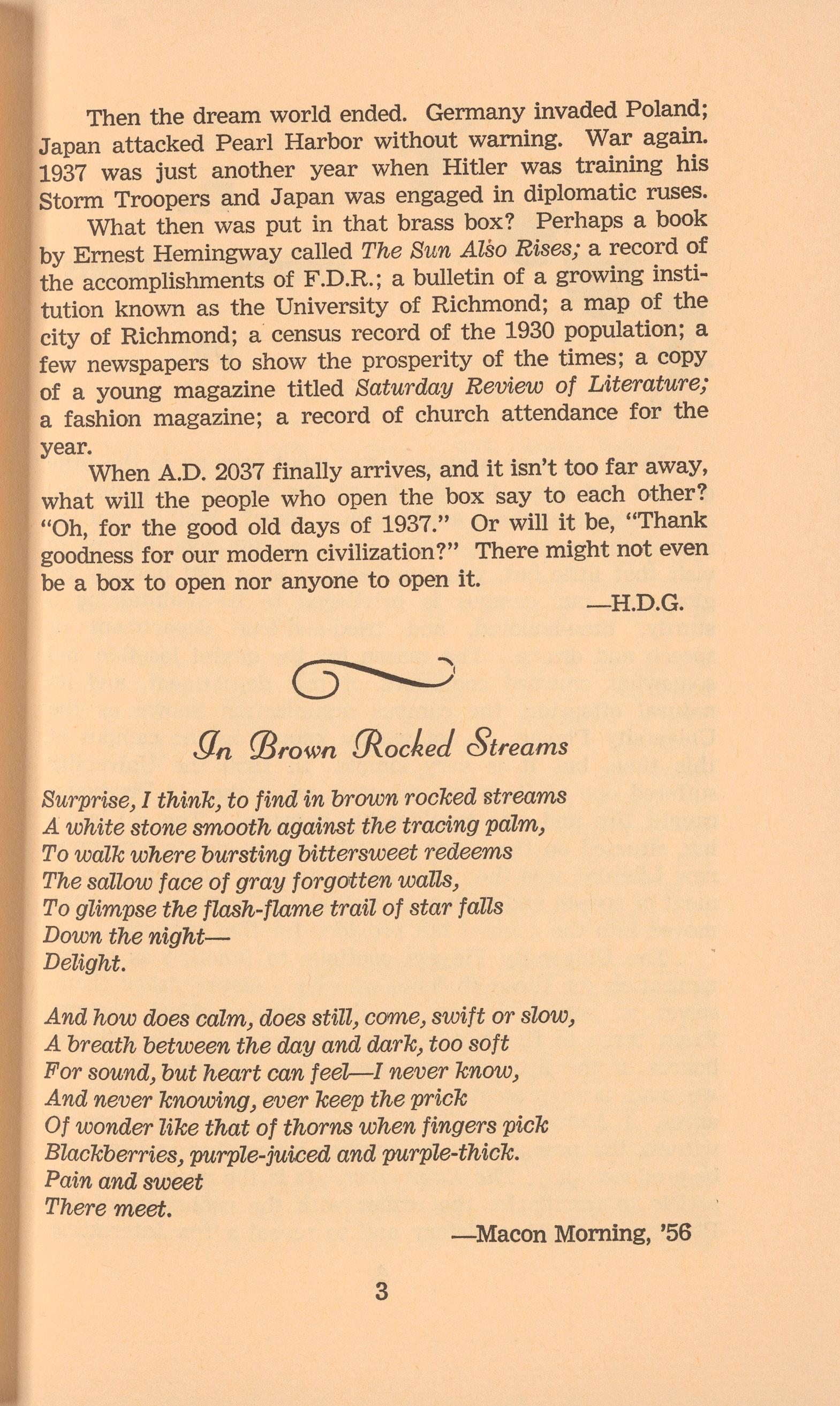
gn
Surprise, I think, to find in brown rocked streams
A white stone smooth against the tracing palm, To walk where bursting bittersweet redeems
The sallow face of gray forgotten walls, To glimpse the flash-flame trail of star falls Down the nightDelight.
And how does calm, does still, come, swift or slow, A breath between the day and dark, too soft
For sound, but heart can feelr-1 never know, And never knowing, ever keep the prick
Of wonder like that of thorns when fingers pick Blackberries, purple-juiced and purple-thick. Pain and sweet
There meet.
-Macon Morning, '56
Have you ever wondered just what goes on in the little quonset hut down the hill behind the chapel? Or did you even know that there exists such a place? Well, if you are one of the many people who have had the good fortune to visit that little hut, you know that it is in that unlikely region that our campus is privileged to be maintaining a sturdy, time-honored, and tried-and-true department of speech and drama. The reason for the quaint location and somewhat crowded conditions of this department, and its natural offspring, the campus organization known as the University Players, is not widely known on the campus at this time, but it is very simple. In 1950 the University suffered one of its worst disasters when the old Playhouse caught fire and was considerably damaged. The old build· ing, situated on the exact spot where now stands our proud new Library, was then torn down, and the excellent depart· ment of speech and drama, as well as the University Players, moved into the quonset hut provided for that purpose. The University Players continue to function as an or• ganization for those students who have distinguished them· selves as actors, writers, or dramatically gifted persons. From three to five productions are staged on the intimate boards of the little building each year. Already this year we have been presented with one of the season's perform· ances, A Murder Has Been Arranged, and we are soon to witness the presentation of another interesting and well-tobe-produced play, The Rainmaker. It is the purpose of this article to familiarize the reader with the rudiments of the Player's fascinating history and to reveal a few interesting
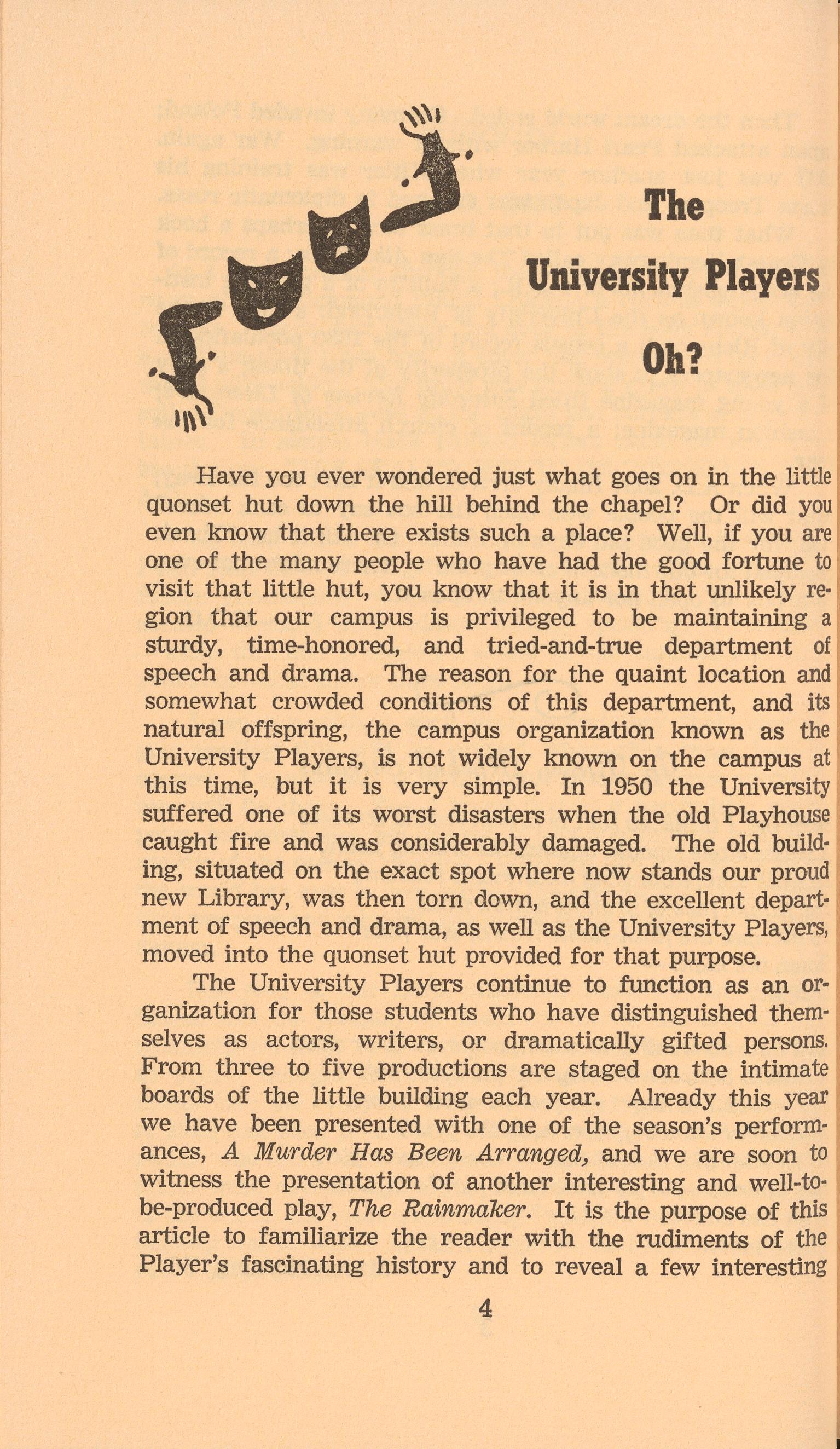
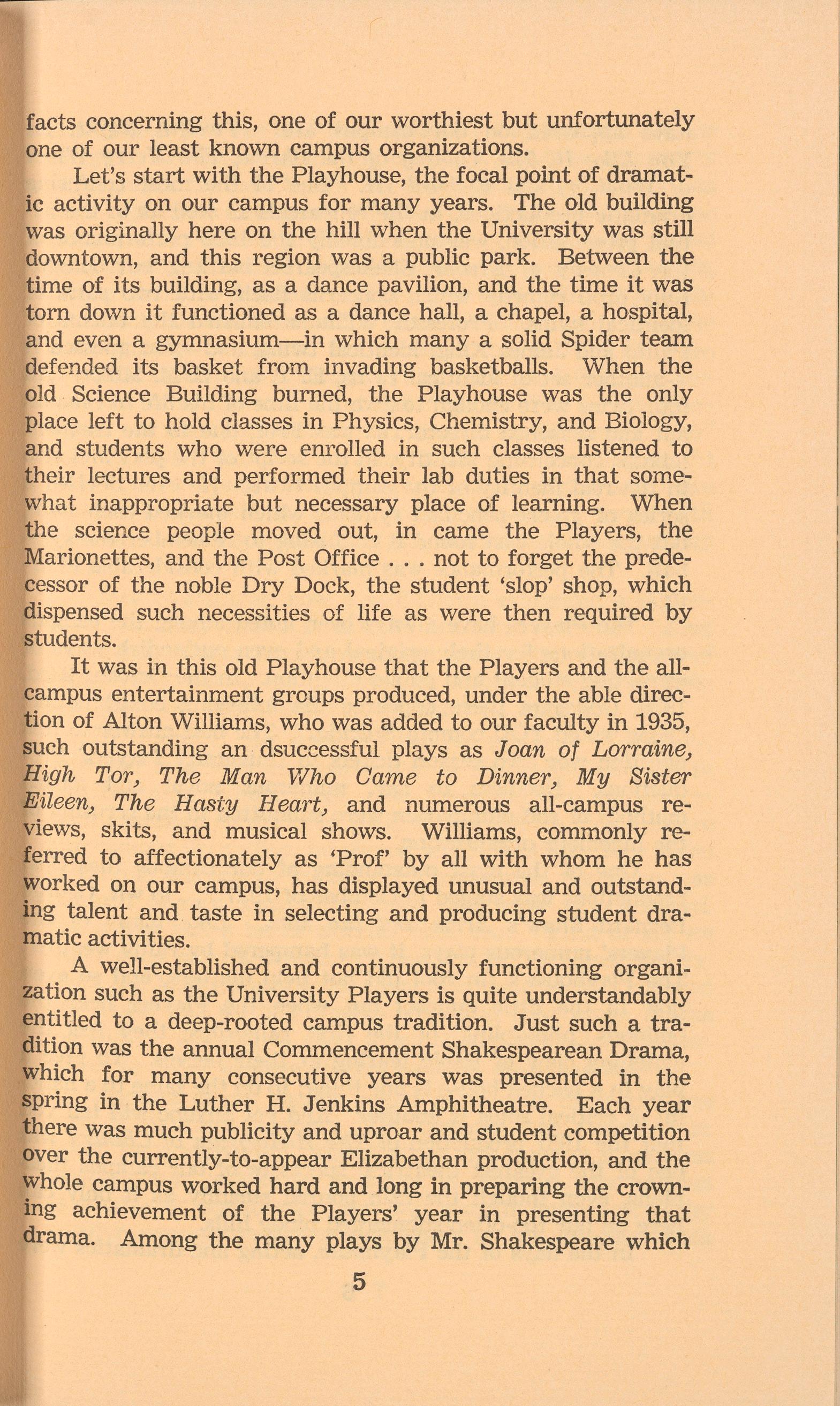
facts concerning this, one of our worthiest but unfortunately one of our least known campus organizations.
Let's start with the Playhouse, the focal point of dramatic activity on our campus for many years. The old building was originally here on the hill when the University was still downtown, and this region was a public park. Between the time of its building, as a dance pavilion, and the time it was torn down it functioned as a dance hall, a chapel, a hospital, and even a gymnasium-in which many a solid Spider team defended its basket from invading basketballs. When the old Science Building burned, the Playhouse was the only place left to hold classes in Physics, Chemistry, and Biology, and students who were enrolled in such classes listened to their lectures and performed their lab duties in that somewhat inappropriate but necessary place of learning. When the science people moved out, in came the Players, the Marionettes, and the Post Office . . . not to forget the predecessor of the noble Dry Dock, the student 'slop' shop, which dispensed such necessities of life as were then required by students.
It was in this old Playhouse that the Players and the allcampus entertainment groups produced, under the able direction of Alton Williams, who was added to our faculty in 1935, such outstanding an dsuccessful plays as Joan of Lorraine, High Tor, The Man Who Came to Dinner, My Sister Eileen, The Hasty Heart, and numerous all-campus reviews, skits, and musical shows. Williams, commonly referred to affectionately as 'Prof' by all with whom he has worked on our campus, has displayed unusual and outstanding talent and taste in selecting and producing student dramatic activities.
A well-established and continuously functioning organization such as the University Players is quite understandably entitled to a deep-rooted campus tradition. Just such a tradition was the annual Commencement Shakespearean Drama, which for many consecutive years was presented in the spring in the Luther H. Jenkins Amphitheatre. Each year there was much publicity and uproar and student competition over the currently-to-appear Elizabethan production, and the whole campus worked hard and long in preparing the crowning achievement of the Players' year in presenting that drama. Among the many plays by Mr. Shakespeare which
have appeared on our campus are: Twelfth Night, As You Like It, The Taming of the Shrew, The Merry Wives of Windsor, and Richard 111. One of the most confusing dramatic productions, in the rehearsals as well as in the actual presentation, was undoubtedly the 1936 performance of the Comedy of Errors, Shakespeare's baffling but delightfully droll comedy which concerns itself with two pairs of identical twins. Professor Williams enlisted the talents of Philip and James King, identical twins, and-you guessed it -another set of identical twins, E. T. and E. M. Miller. All four twins were enough to give the time of his life to even an apt and seasoned director, as was Prof, due to the frequent mixups concerning identity, in the script of the play and also in the real identity of the campus twins. He even devised a series of grease-pencilled symbols which marked each twin, but the whole cast found it confusing to remember the symbols. The performance was marked with considerable hilarity.
The Players have always been noted among the campus organizations for their original and even outlandish ways of attracting student and public attention. In the October 23rd, 1936, Collegian there appeared the following boxed notice: "How would YOU commit Suicide?" The best answer to this question won two season tickets to University Players' Productions. Needless to say, numerous novel and garish methods of self-elimination were submitted to the scrutiny of the ingenious organization.
One of the most outstanding of our campus theatrical productions was staged in October of 1937 ... to wit, George Bernard Shaw's Arms and the Man. Like many of the Players' numerous plays, it was hampered by rainy weather. The Playhouse's tin roof did not help matters, and so even now in the little quonset hut when the Players hear the ominous 'plink-plink' of the first raindrops, they feel the clutching claw of Panic tearing at their nerves. To give a play to a packed house is one thing; to do the same to a hand· ful of critical souls is another. And yet anyone will tell you that the 1951 production of The Madwoman of Chaillot was one of the greatest theatrical successes of our campus thes· pians, even though the rain poured steadily as it only can here on our too-often-submerged piney hills.
In the days of the Playhouse, acting and dramatics were 6

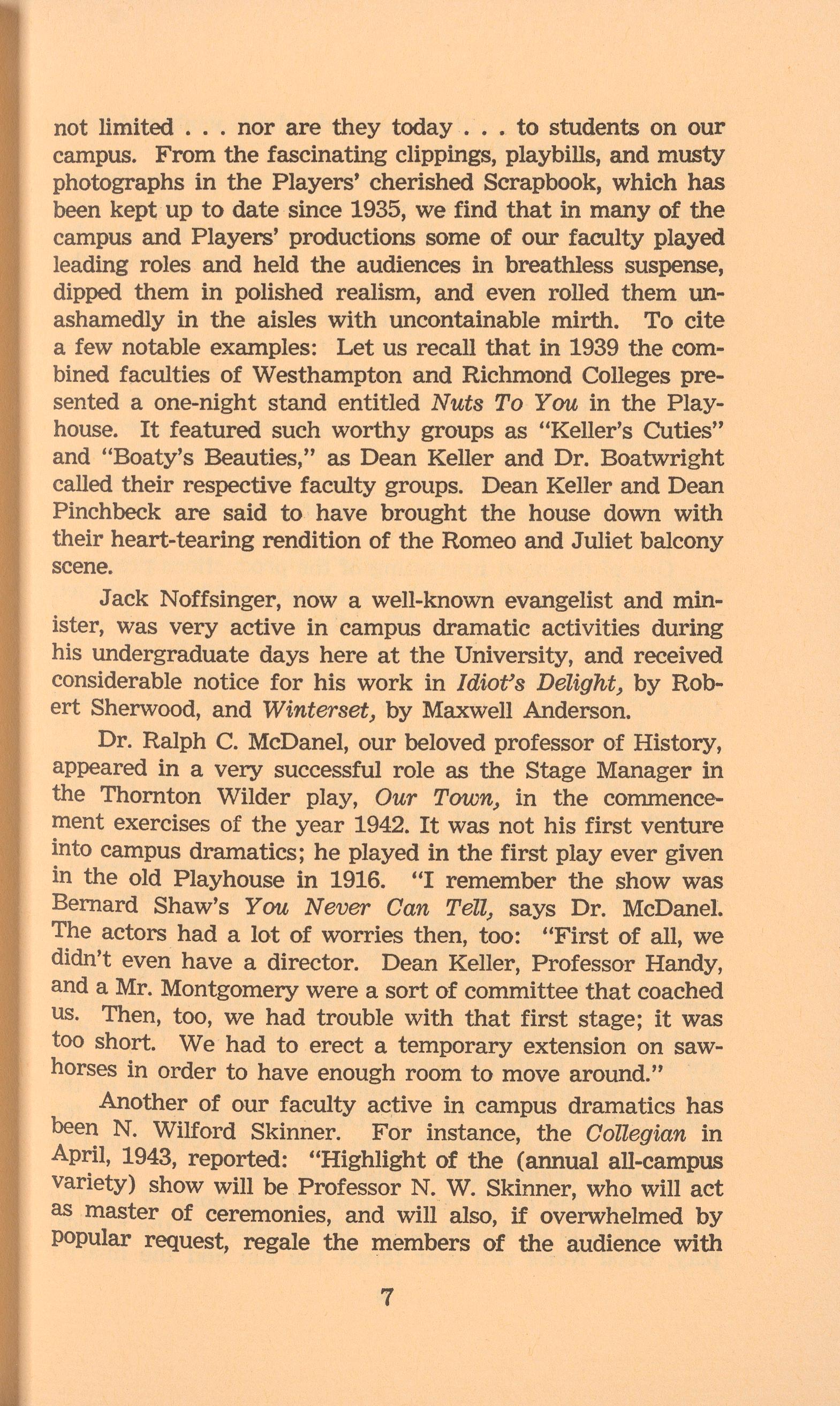
not limited . . . nor are they today . . . to students on our campus. From the fascinating clippings, playbills, and musty photographs in the Players' cherished Scrapbook, which has been kept up to date since 1935, we find that in many of the campus and Players' productions some of our faculty played leading roles and held the audiences in breathless suspense, dipped them in polished realism, and even rolled them unashamedly in the aisles with uncontainable mirth. To cite a few notable examples: Let us recall that in 1939 the combined faculties of Westhampton and Richmond Colleges presented a one-night stand entitled Nuts To You in the Playhouse. It featured such worthy groups as "Keller's Cuties" and "Boaty's Beauties," as Dean Keller and Dr. Boatwright called their respective faculty groups. Dean Keller and Dean Pinchbeck are said to have brought the house down with their heart-tearing rendition of the Romeo and Juliet balcony scene.
Jack Noffsinger, now a well-known evangelist and minister, was very active in campus dramatic activities during his undergraduate days here at the University, and received considerable notice for his work in Idiot's Delight, by Robert Sherwood, and Winterset, by Maxwell Anderson.
Dr. Ralph C. McDanel, our beloved professor of History, appeared in a very successful role as the Stage Manager in the Thornton Wilder play, Our Town, in the commencement exercises of the year 1942. It was not his first venture into campus dramatics; he played in the first play ever given in the old Playhouse in 1916. "I remember the show was Bernard Shaw's You Never Can Tell, says Dr. McDanel. The actors had a lot of worries then, too: "First of all, we didn't even have a director. Dean Keller, Professor Handy, and a Mr. Montgomery were a sort of committee that coached us. Then, too, we had trouble with that first stage; it was too short. We had to erect a temporary extension on sawhorses in order to have enough room to move around."
Another of our faculty active in campus dramatics has been N. Wilford Skinner. For instance, the Collegian in April, 1943, reported: "Highlight of the (annual all-campus variety) show will be Professor N. W. Skinner, who will act as master of ceremonies, and will also, if overwhelmed by popular request, regale the members of the audience with
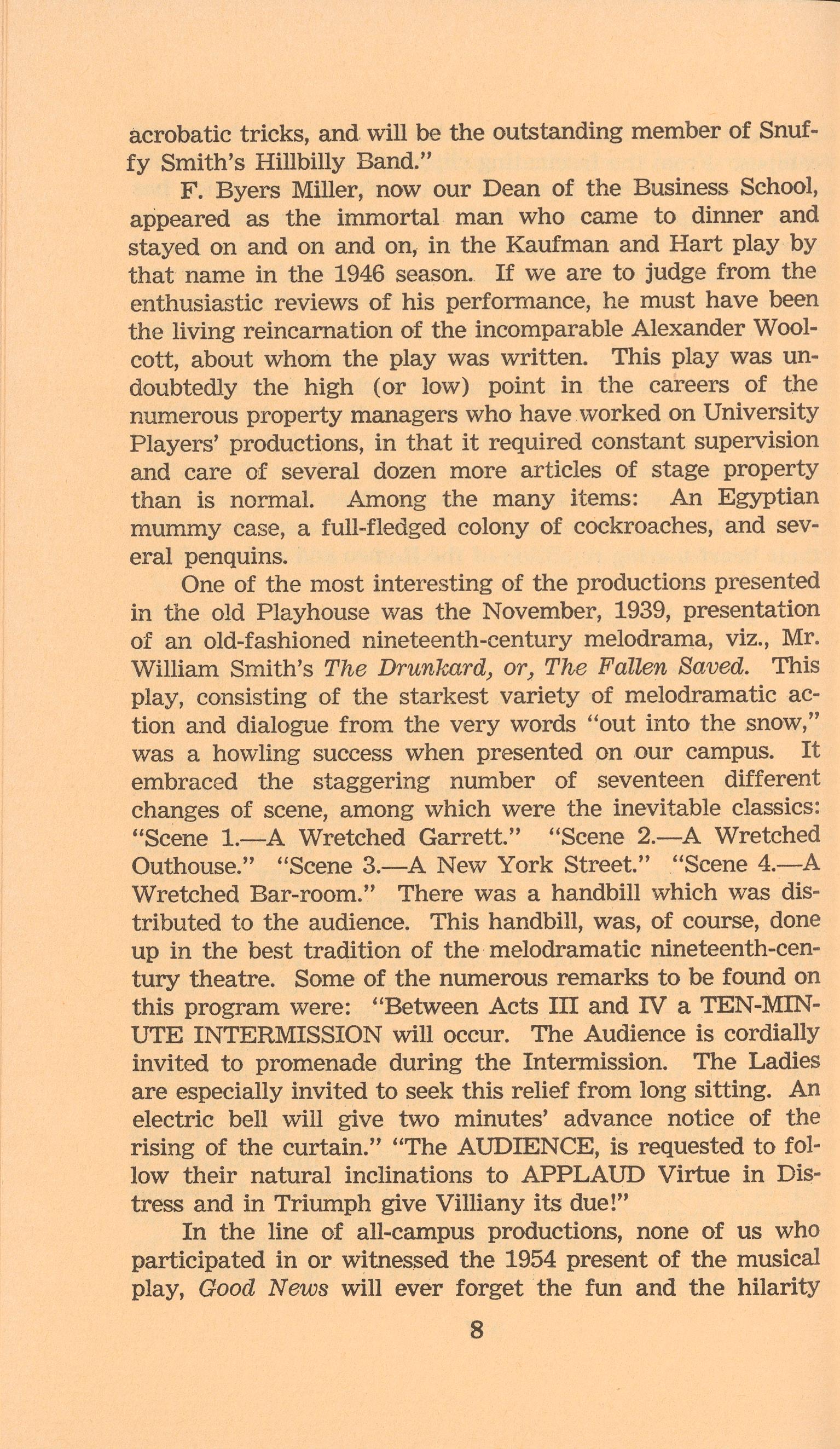
acrobatic tricks, and . will be the outstanding member of Snuffy Smith's Hillbilly Band."
F. Byers Miller, now our Dean of the Business School, appeared as the immortal man who came to dinner and stayed on and on and on; in the Kaufman and Hart play by that name in the 1946 season. If we are to judge from the enthusiastic reviews of his performance, he must have been the living reincarnation of the incomparable Alexander Woolcott, about whom the play was written. This play was undoubtedly the high (or low) point in the careers of the numerous property managers who have worked on University Players' productions, in that it required constant supervision and care of several dozen more articles of stage property than is normal. Among the many items: An Egyptian mummy case, a full-fledged colony of cockroaches, and several penguins.
One of the most interesting of the productions presented in the old Playhouse was the November, 1939, presentation of an old-fashioned nineteenth-century melodrama, viz., Mr . William Smith's The Drunkard) or) The Fallen Saved. This play, consisting of the starkest variety of melodramatic action and dialogue from the very words "out into the snow," was a howling success when presented on our campus. It embraced the staggering number of seventeen different changes of scene, among which were the inevitable classics: "Scene 1.-A Wretched Garrett." "Scene 2.-A Wretched Outhouse." "Scene 3.-A New York Street." "Scene 4.-A Wretched Bar-room." There was a handbill which was distributed to the audience. This handbill, was, of course, done up in the best tradition of the melodramatic nineteenth-century theatre. Some of the numerous remarks to be found on this program were: "Between Acts III and IV a TEN-MINUTE INTERMISSION will occur. The Audience is cordially invited to promenade during the Intermission. The Ladies are especially invited to seek this relief from long sitting. An electric bell will give two minutes' advance notice of the rising of the curtain." "The AUDIENCE, is requested to follow their natural inclinations to APPLAUD Virtue in Distress and in Triumph give Villiany its due!"
In the line of all-campus productions, none of us who participated in or witnes . sed the 1954 present of the musical play, Good News will ever forget the fun and the hilarity
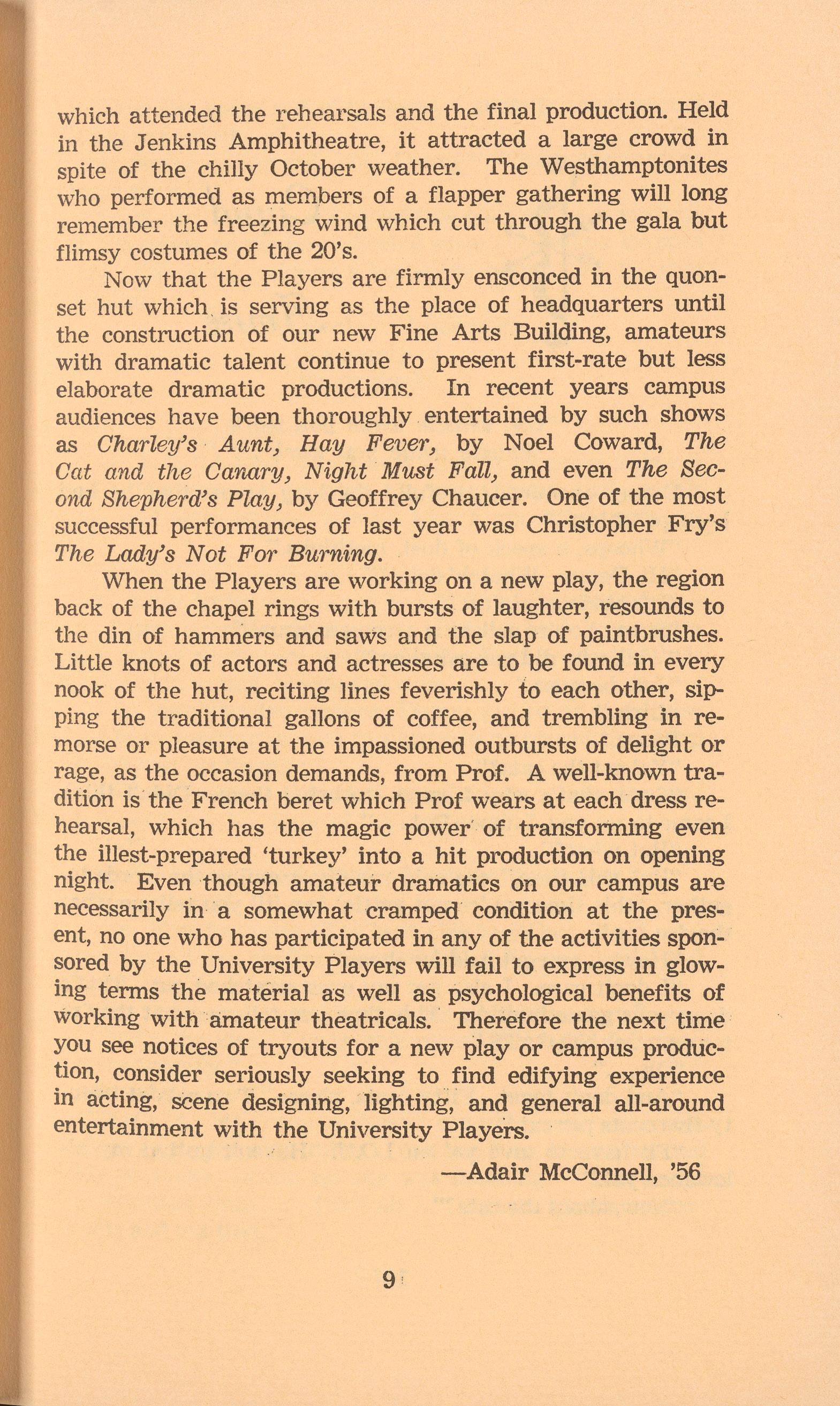
which attended the rehearsals and the final production. Held in the Jenkins Amphitheatre, it attracted a large crowd in spite of the chilly October weather. The Westhamptonites who performed as members of a flapper gathering will long remember the freezing wind which cut through the gala but flimsy costumes of the 20's.
Now that the Players are firmly ensconced in the quonset hut which . is serving as the place of headquarters until the construction of our new Fine Arts Building, amateurs with dramatic talent continue to present first-rate but less elaborate dramatic productions. In recent years campus audiences have been thoroughly entertained by such shows as Charley's · Aunt, Hay Fever, by Noel Coward, The Cat and the Canary, Night Must Fall, and even The Second Shepherd's Play, by Geoffrey Chaucer. One of the most successful performances of last year was Christopher Fry's The Lady's Not For Burning.
When the Players are working on a new play, the region back of the chapel rings with bursts of laughter, resounds to the din of hammers and saws and the slap of paintbrushes. Little knots of actors and actresses are to be found in every nook of the hut, reciting lines feverishly to each other, sipping the traditional gallons of coffee, and trembling in remorse or pleasure at the impassioned outbursts of delight or rage, as the occasion demands, from Prof. A well-known tradition is .the French beret which Prof wears at each dress rehearsal, which has the magic power · of transforming even the illest-prepared 'turkey' into a hit production on opening night. Even though amateur dramatics on our campus are necessarily in a somewhat cramped condition at the present, no one who has participated in any of the activities sponsored by the University Players will fail to express in glowing terms the material as well as psychological benefits of working with amateur theatricals. · Therefore the next time you see notices of tryouts for a new play or campus production, consider seriously seeking to find edifying experience in acting, scene designing, lighting, and general all-around entertainment with the University Players.
-Adair McConnell, '56
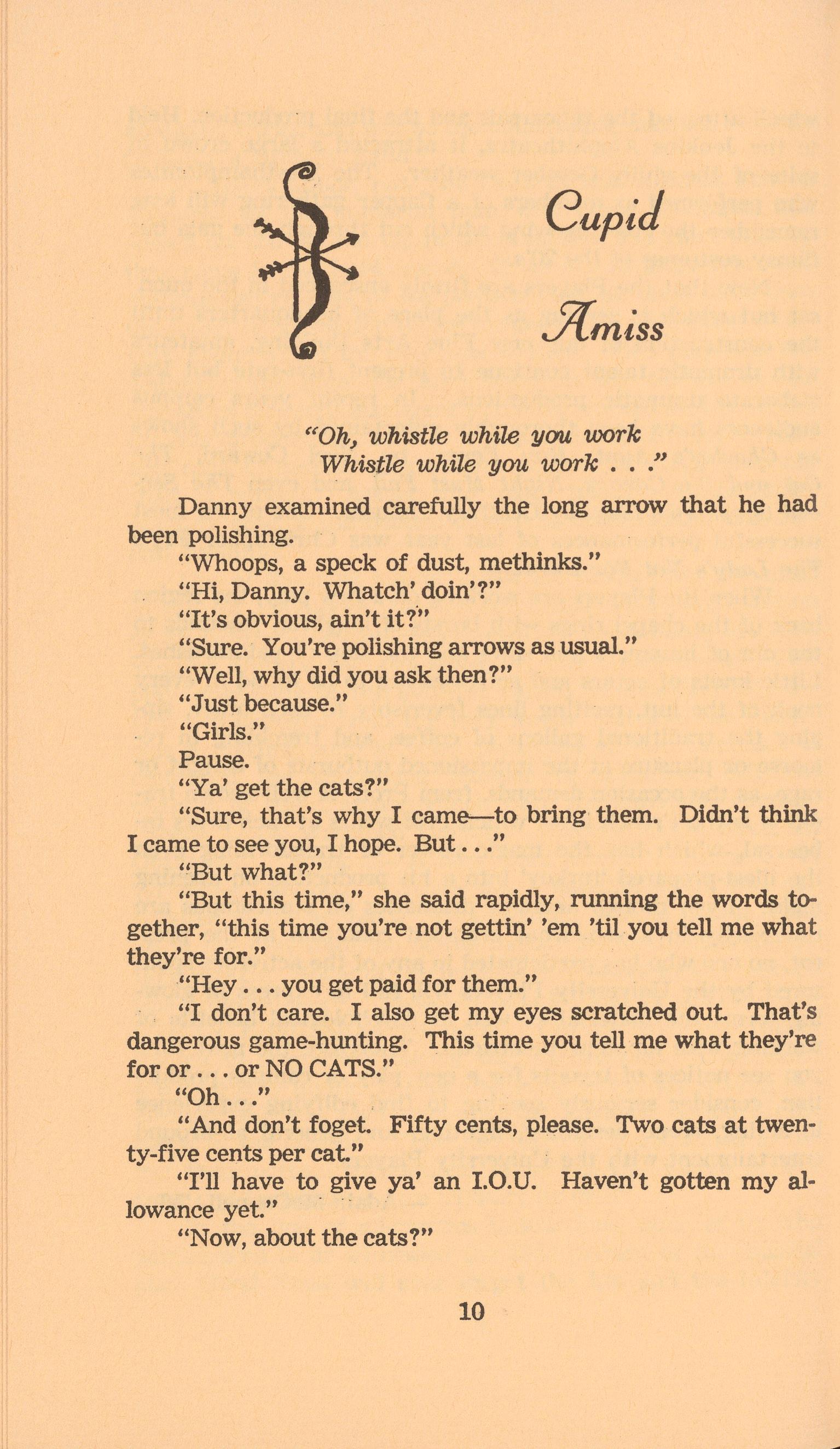
"Oh, whistle while yau work Whistle while you work . . ."
Danny examined carefully the long arrow that he had been polishing.
"Whoops, a speck of dust, methinks."
"Hi, Danny. Whatch' doin'?"
"It's obvious, ain't it?°"
"Sure. You're polishing arrows as usual."
"Well, why did you ask then?"
"Just because."
"Girls."
Pause.
"Ya' get the cats?"
"Sure, that's why I came-to bring them. Didn't think I came to see you, I hope. But ... "
"But what?"
"But this time," she said rapidly, running the words together, "this time you're not gettin' 'em 'til you tell me what they're for."
"Hey ... you get paid for them."
"I don't care. I also get my eyes scratched out. That's dangerous game-hunting. This time you tell me what they're for or ... or NO CATS."
"Oh ... "
"And don't foget. Fifty cents, please. Two cats at twenty-five cents per cat."
"I'll have to give ya' an 1.O.U. Haven't gotten my allowance yet."
"Now, about the cats?"
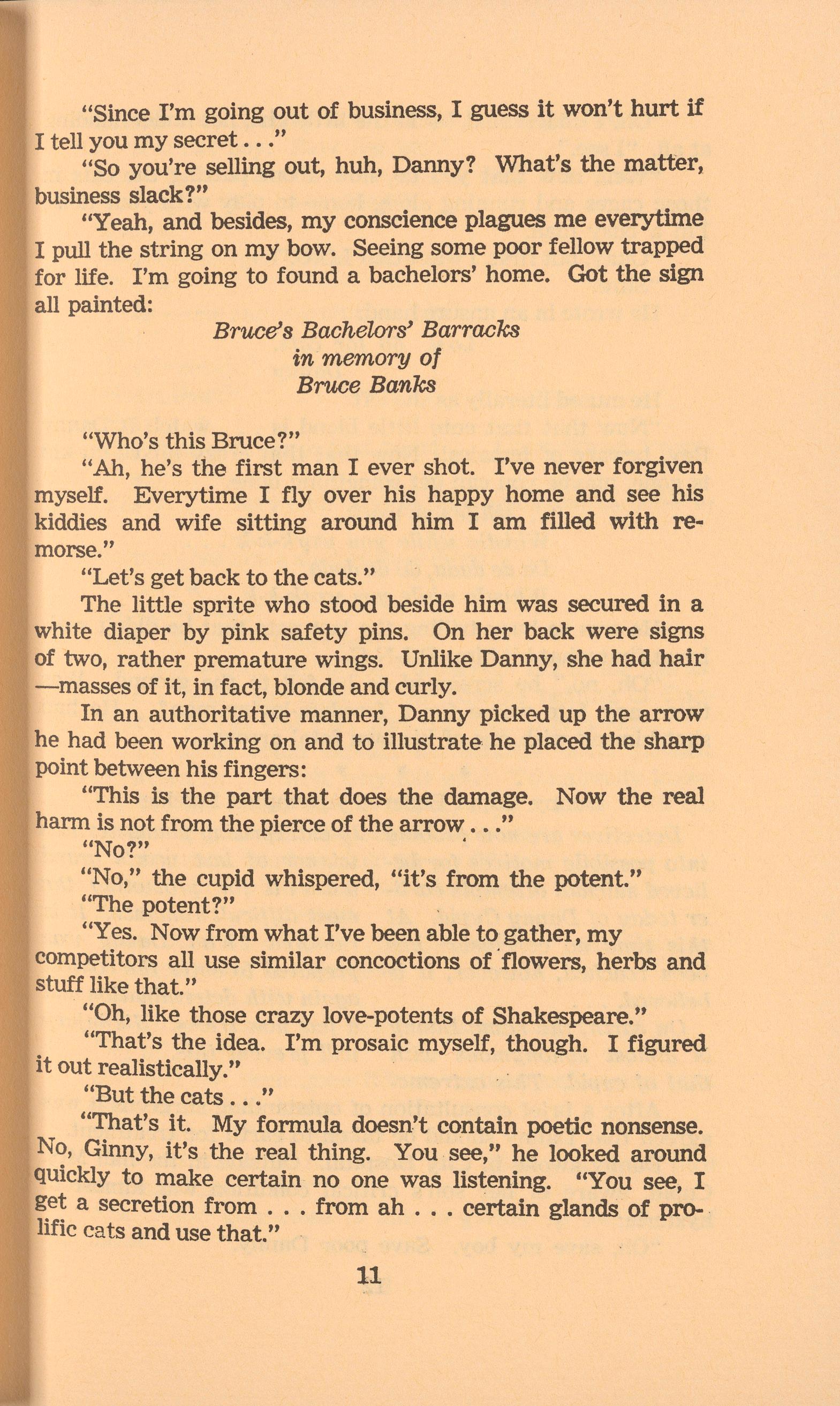
"Since I'm going out of business, I guess it won't hurt if I tell you my secret ... "
"So you're selling out, huh, Danny? What's the matter, business slack?"
"Yeah, and besides, my conscience plagues me everytlme I pull the string on my bow. Seeing some poor fellow trapped for life. I'm going to found a bachelors' home. Got the sign all painted:
"Who's this Bruce?"
"Ah, he's the first man I ever shot. I've never forgiven myself. Everytime I fly over his happy home and see his kiddies and wife sitting around him I am filled with remorse."
"Let's get back to the cats."
The little sprite who stood beside him was secured in a white diaper by pink safety pins. On her back were signs of two, rather premature wings. Unlike Danny, she had hair -masses of it, in fact, blonde and curly.
In an authoritative manner, Danny picked up the arrow he had been working on and to illustrate he placed the sharp point between his fingers:
"This is the part that does the damage. Now the real harm is not from the pierce of the arrow ... " "No?" '
"No," the cupid whispered, "it's from the potent."
"The potent?"
"Yes. Now from what I've been able to gather, my competitors all use similar concoctions of ·flowers, herbs and stuff like that."
"Oh, like those crazy love-potents of Shakespeare."
"That's the idea. I'm prosaic myself, though. I figured it out realistically."
"But the cats ... "
"That's it. My formula doesn't contain poetic nonsense. No, Ginny, it's the real thing. You see," he looked around quickly to make certain no one was listening. "You see, I get a secretion from . . . from ah . . . certain glands of prolific cats and use that."
"Oh, I understand," said the little girl, not understanding at all. "I see."
"Well, now that you do, how about putting the cats in those cages and running along home to play with your dolls. I'm a busy man."
"Okay, but first, I want that I.O.U." ·"Sure."
He wrote in an unsure hand: i.o.u .. 50 for cats.
He mused literally as she left:
"Now that that cute little blond is ... watch it Danny Boy, beware of females! Now that that crazy mixed-up kid is gone, maybe you can get something done."
" while you work
Whistle while you work-k-k . . .
Da de dada, da de dada
Whistle while you work-k-k . . ."
He was so busy trilling the last note that he didn't realize at first what hit him. P-I-N-G.
"Oh, no," he screamed as he fell to the ground. Was there any fate worse for a freedom-loving-man? He had shot himself with one of his own fatal arrows.
Detectives are now probing into possibile motives for believed suicidal attempts earlier today of Danny Cupid. At this time no conclusion has been reached, 7wwever, it is believed . ...
On earth, the name Danny is a7,most synonymous with that of cupid. This extreme-
ly enterprising youngster was winner of 7,a,styear's grand a w a r d for promoting the most difficult romance. It is rumored t ha t Danny was prepared to enter the contest again with determination and a few new tricks. His injury will prevent this.
After a brief consultation of outstanding surgeons it was agreed that Danny should be taken to earth for treatment. Danny awoke in City Hospital. Outside in the hall Mrs. Cupid, aware of her son's critical condition was almost tn hysteria:
"Oh, save my boy. Save poor Danny."


Danny, too, panicky now for his life cried inside: "Oh, save her boy. Save her boy."
Three interns and a nurse rushed past Mrs. Cupid.
"D. Cupid, 203, has rallied."
"Check."
"Measure oxygen content of blood." "Check."
"Pulse-one and one-tenth m.p.h."
"Eh?"
"Better check."
"Heart Beat?"
"Yes."
"Dr. Mason, listen to that heart ... I say, it's an irregularity, I say ... "
"Yes sir ... very odd. Sounds like iambic pentameter to me."
"Better give him a shot of something."
"Whisky?"
"Mouth or vein?"
"Now about this heart beat."
The four adjourned to the Conference Room for discussion with a heart specialist on the strange beating of Danny's heart. In the end they had reached no decision. Danny alone could explain the strange heart pattern. It was caused by ... well, why tell you? You already know. Placing his finger on the bell he kept it there until the pretty nurse appeared. She called him honey.
"Well, honey, what can I do for you?"
"Come a little closer and let me tell you."
She moved up to the bed.
"Now bend over and let me whisper it to you. You see, it's a little personal," he blushed.
"Well, now, I ... "
"Could you, please ... well that is, my diaper ... "
"By all means.' 1
She had not been gone fifteen minutes before his little mit was on the bell again.
"Well, what is it, this time?"
"It's too warm in here. Do you think you could turn back my blanket a little?"
She leaned over close to him to gather up the edges of the cover.
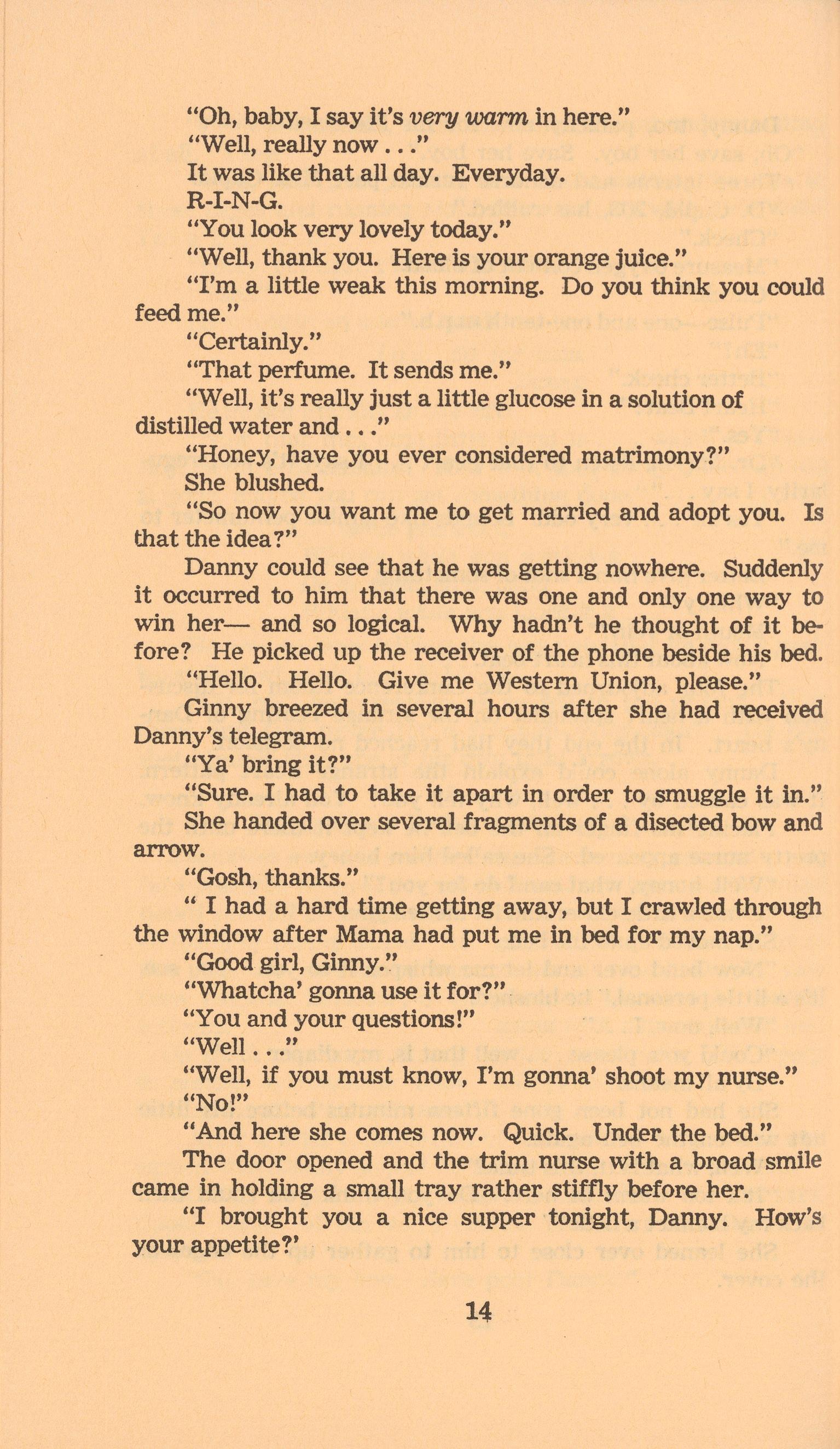
"Oh, baby, I say it's very warm in here."
"Well, really now ... "
It was like that all day. Everyday. R-I-N-G.
"You look very lovely today."
"Well, thank you. Here is your orange juice."
"I'm a little weak this morning. Do you think you could feed me."
"Certainly."
"That perfume. It sends me."
"Well, it's really just a little glucose in a solution of distilled water and ... "
"Honey, have you ever considered matrimony?"
She blushed.
"So now you want me to get married and adopt you. Is that the idea?"
Danny could see that he was getting nowhere. Suddenly it occurred to him that there was one and only one way to win her-and so logical. Why hadn't he thought of it before? He picked up the receiver of the phone beside his bed.
''Hello. Hello. Give me Western Union, please."
Ginny breezed in several hours after she had received Danny's telegram.
"Ya' bring it?"
"Sure. I had to take it apart in order to smuggle it in." She handed over several fragments of a disected bow and arrow.
"Gosh, thanks."
" I had a hard time getting away, but I crawled through the window after Mama had put me in bed for my nap."
"Good girl, Ginny."
"Whatcha' gonna use it for?"
"You and your questions!"
"Well ... "
"Well, if you must know, I'm gonna' shoot my nurse."
"No!"
"And here she comes now. Quick. Under the bed."
The door opened and the trim nurse with a broad smile came in holding a small tray rather stiffly before her.
"I brought you a nice supper tonight, Danny. How's your appetite?'
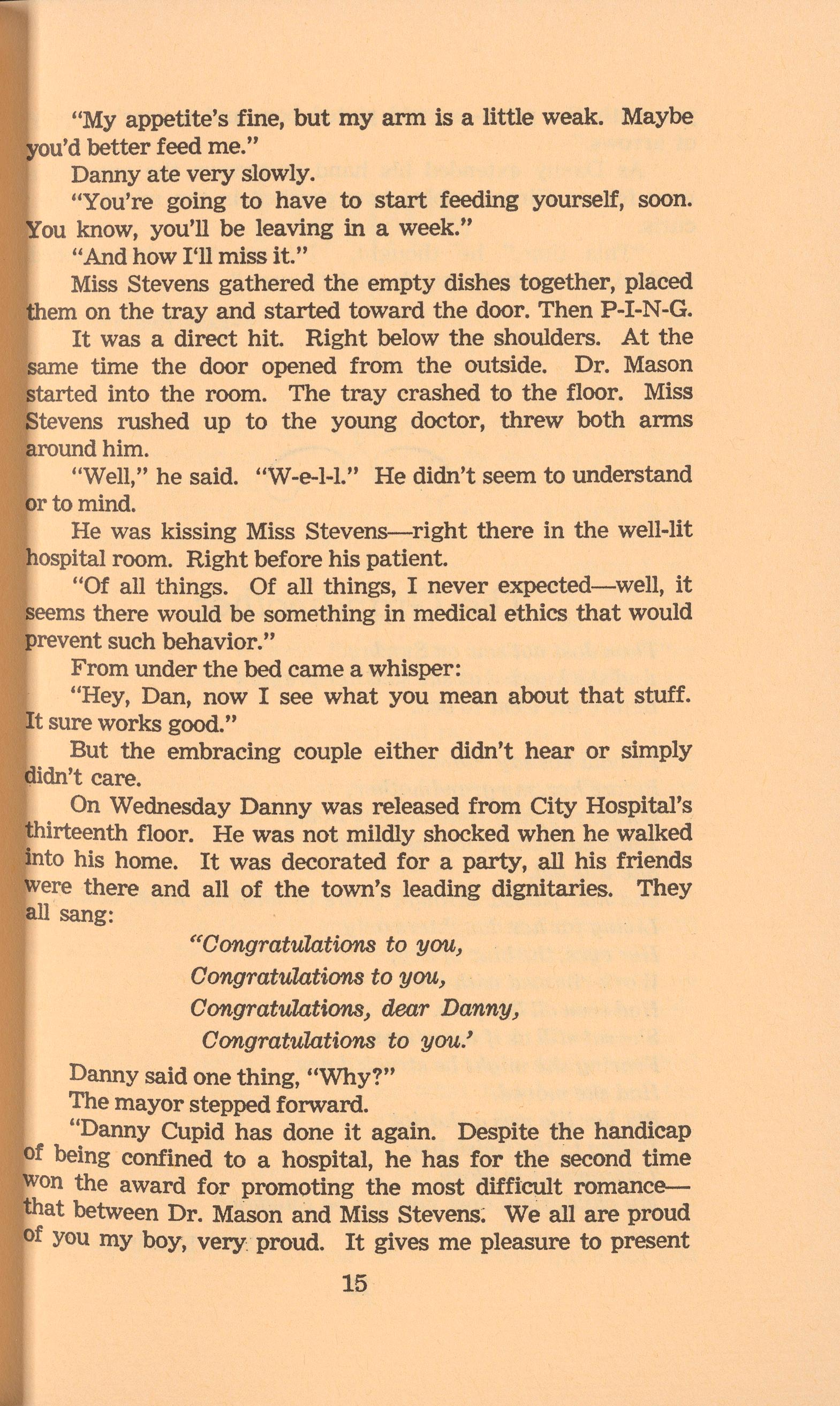
"My appetite's fine, but my arm is a little weak. Maybe you'd better feed me."
Danny ate very slowly.
"You're going to have to start feeding yourself, soon. You know, you'll be leaving in a week."
"And how I'll miss it."
Miss Stevens gathered the empty dishes together, placed em on the tray and started toward the door. Then P-1-N-G.
It was a direct hit. Right below the shoulders. At the same time the door opened from the outside. Dr. Mason started into the room. The tray crashed to the floor. Miss Stevens rushed up to the young doctor, threw both arms around him.
"Well," he said. "W-e-1-1." He didn't seem to understand or to mind.
He was kissing Miss Stevens-right there in the well-lit hospital room. Right before his patient.
"Of all things. Of all things, I never expected-well, it seems there would be something in medical ethics that would prevent such behavior."
From under the bed came a whisper: "Hey, Dan, now I see what you mean about that stuff. It sure works good."
But the embracing couple either didn't hear or simply 'dn't care.
On Wednesday Danny was released from City Hospital's thirteenth floor. He was not mildly shocked when he walked into his home. It was decorated for a party, all his friends were there and all of the town's leading dignitaries. They all sang:
"Congratulations to y<YU, Congratulations to y<YU, Congratulations, dear Danny, Congratulations to y<YU.'
Danny said one thing, "Why?"
The mayor stepped forward.
"Danny Cupid has done it again. Despite the handicap of being confined to a hospital, he has for the second time won the award for promoting the most difficult romancethat between Dr. Mason and Miss Stevens: We all are proud of you my boy, very proud. It gives me pleasure to present
you with the prize--a gold plated bow and a year's suppl~ of arrows."
As Danny extended his hand to receive the award hil eyes fell on Ginny, a blue bow perched in the midst of he1 curls.
"This time," he thought, "I'll try the old-fashione<l method of sweettalk, candy and flowers."
-Lois Reamy, '56.
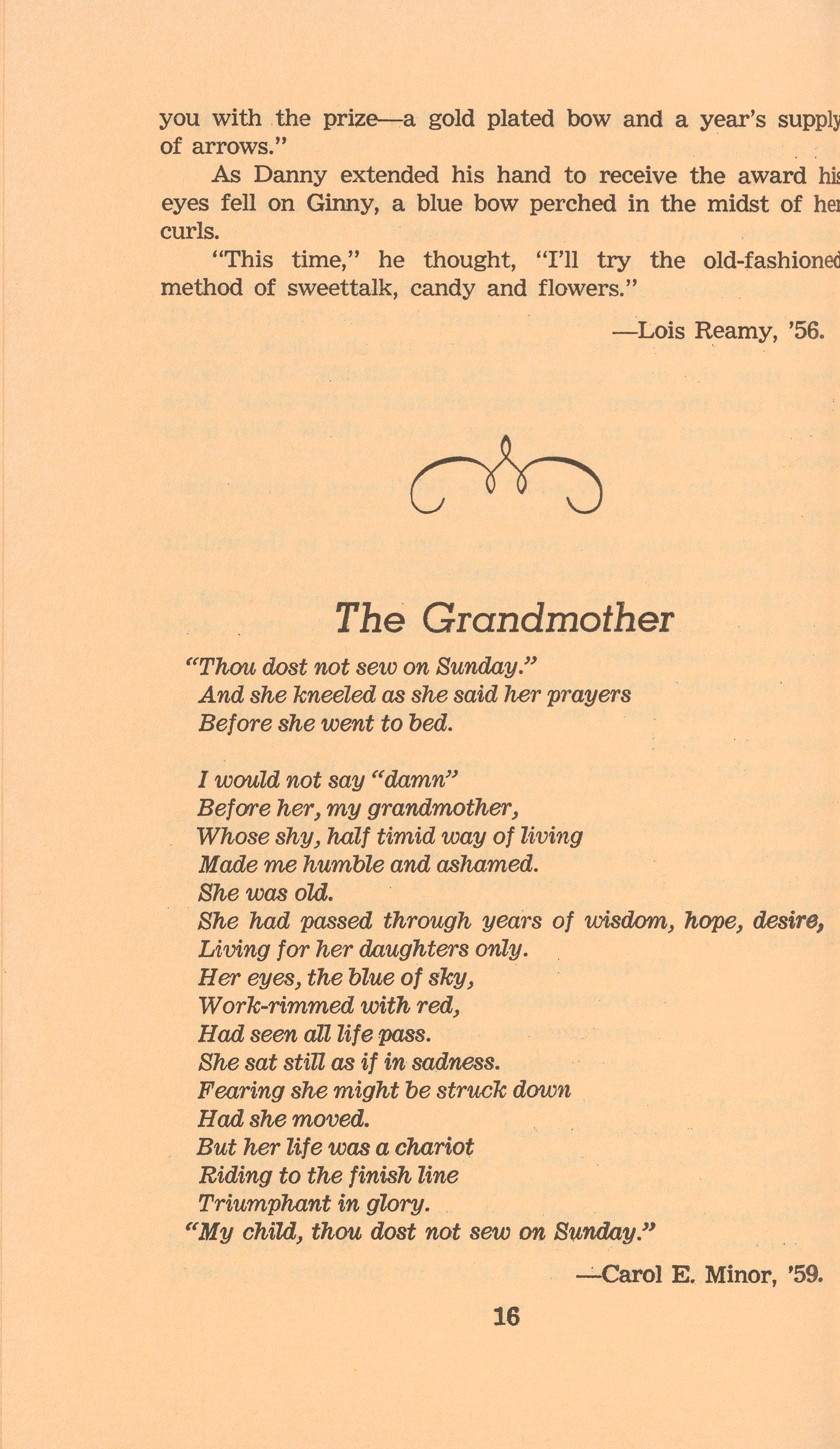
"Thou dost not sew on Sunday."
And she kneeled as she said her prayers Before she went to bed.
I would not say "damn"
Befare her, my grandmother, Whose shy, half timid way of living Made me humble and ashamed. She was oW,. She had passed through years of wisdom, hope, desire, Living for her daughters only. Her eyes, the blue of sky, Work-rimmed with red, Had seen all life pass. She sat still as if in sadness. Fearing she might be struck down Had she moved.
But her life was a chariot Riding to the finish line Triumphant in glory.
"My child, thou dost not sew on Sunday." __;_QuoolE. Minor, '59.
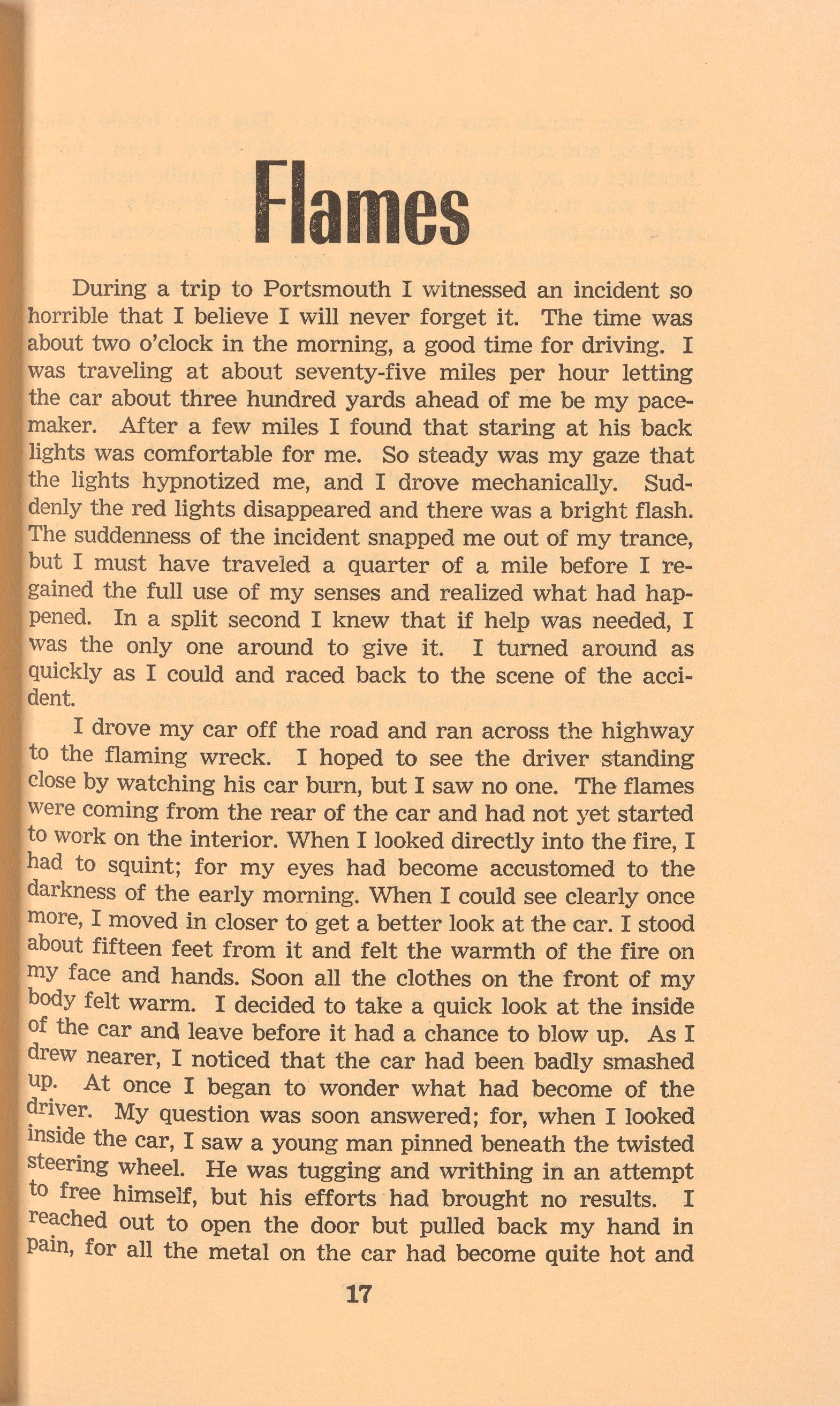
During a trip to Portsmouth I witnessed an incident so horrible that I believe I will never forget it. The time was about two o'clock in the morning, a good time for driving. I was traveling at about seventy-five miles per hour letting the car about three hundred yards ahead of me be my pacemaker. After a few miles I found that staring at his back lights was comfortable for me. So steady was my gaze that the lights hypnotized me, and I drove mechanically. Suddenly the red lights disappeared and there was a bright flash. The suddenness of the incident snapped me out of my trance, but I must have traveled a quarter of a mile before I regained the full use of my senses and realized what had happened. In a split second I knew that if help was needed, I was the only one around to give it. I turned around as quickly as I could and raced back to the scene of the accident.
I drove my car off the road and ran across the highway to the flaming wreck. I hoped to see the driver standing close by watching his car burn, but I saw no one. The flames were coming from the rear of the car and had not yet started to work on the interior. When I looked directly into the fire, I had to squint; for my eyes had become accustomed to the darkness of the early morning. When I could see clearly once more, I moved in closer to get a better look at the car. I stood about fifteen feet from it and felt the warmth of the fire on my face and hands. Soon all the clothes on the front of my body felt warm. I decided to take a quick look at the inside of the car and leave before it had a chance to blow up. As I drew nearer, I noticed that the car had been badly smashed up. At once I began to wonder what had become of the driver. My question was soon answered; for, when I looked inside the car, I saw a young man pinned beneath the twisted steering wheel. He was tugging and writhing in an attempt to free himself, but his efforts had brought no results. I reached out to open the door but pulled back my hand in Pain, for all the metal on the car had become quite hot and
the door handle was no exception. The man inside yelled for help and squirmed even harder than before. I put a handkerchief on my sore hand and grabbed the handle again. The door was stuck fast. I ran around to the driver's side and tried that door. It was also stuck. The flames were spread• ing and the heat was becoming oppressive. I threw off my ja(!ket and my soaked shirt, which were beginning to feel like dead weights. I pulled and tugged at the door with all my might but to no avail. My hands were numb from their burns.
When the fire got to the tires, I had to step back; for the stench and the smoke from them were suffocating. The back door on the driver's side was bent and could not be opened I ran around to the other side and tried the back door there. It was locked. I yelled to the driver to try to reach the lock for the back door, but he didn't hear me. I could see that the car was full of smoke. His screams had turned to moans between gagging cooughs. I could hear the fizz made by my perspiration evaporating as soon as it was formed. Above the fizz I heard the crackling of the fire. It seemed to be laugh• ing at me.
Suddenly I was engulfed in a wall of fire; my pants were flaming. I tore them off as quickly as possible, but I was not quick enough. I had large horrible burns all over my legs and chest. The flames had closed the wounds, so they did not bleed. Although all the hair was burnt from my head, I felt no pain. I was in a state of shock. My actions were mechanical, and I moved by instinct.
I did the only thing left to do. I put my fist through the window and opened the door with the inside handle. The broken glass opened gashes in my arm. A new smell came to my nose; but I could not identify it. I yanked the door open but could not get inside, for the seats were on fire. I strained my eyes to make out the figure of the man. To mY horror I saw that he was on fire. Then I knew what the smell was. It was the smell of burning flesh. I was too horrified to move. I saw his flesh roll off his skull like hOt wax.
The lick of a flame on my bare back brought me to mY senses. I walked a few yards from the wreck and vomited . -Jerry Schonfeld, '58.

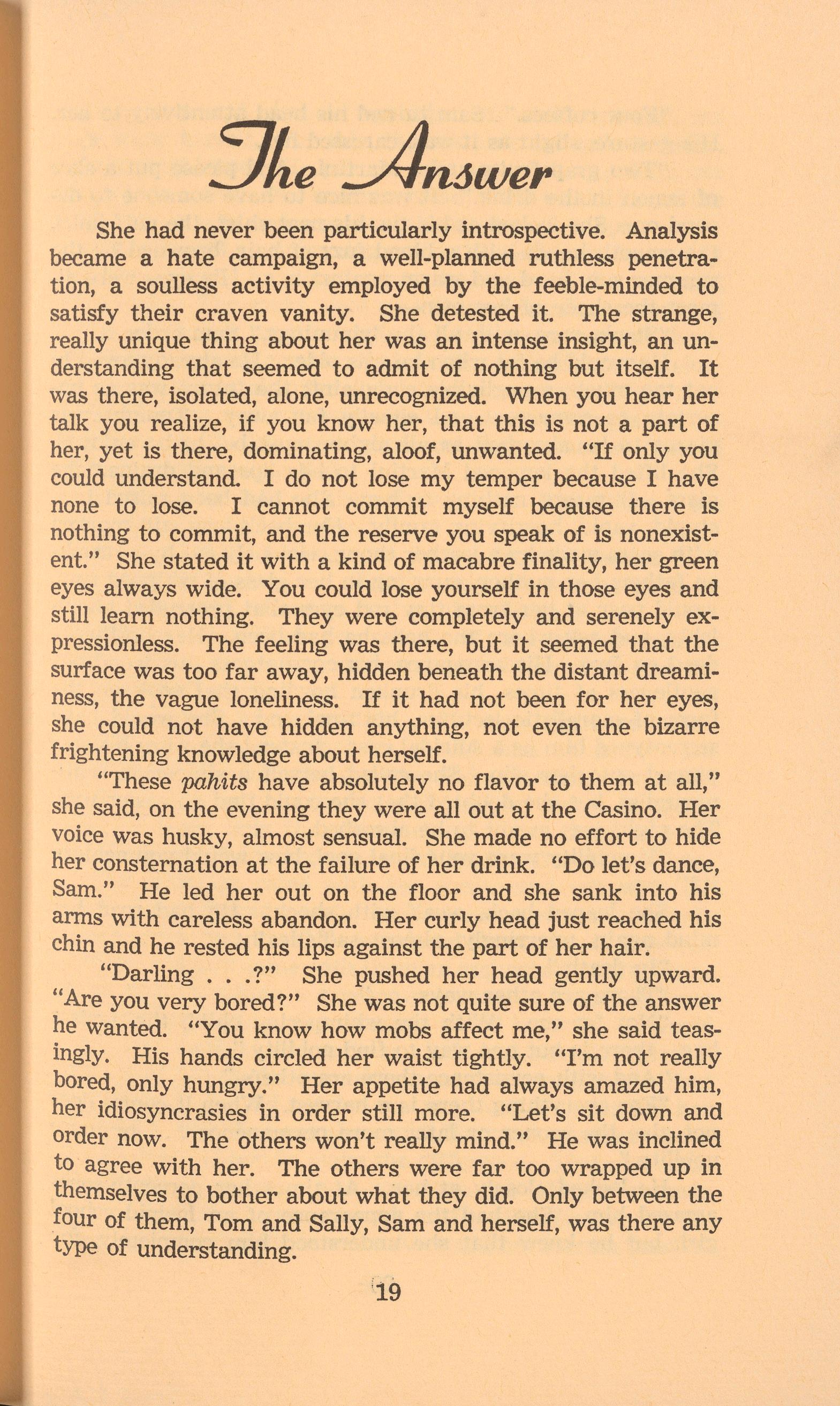
She had never been particularly introspective. Analysis became a hate campaign, a well-planned ruthless penetration, a soulless activity employed by the feeble-minded to satisfy their craven vanity. She detested it. The strange, really unique thing about her was an intense insight, an understanding that seemed to admit of nothing but itself. It was there, isolated, alone, unrecognized. When you hear her talk you realize, if you know her, that this is not a part of her, yet is there, dominating, aloof, unwanted. "If only you could understand. I do not lose my temper because I have none to lose. I cannot commit myself because there is nothing to commit, and the reserve you speak of is nonexistent." She stated it with a kind of macabre finality, her green eyes always wide. You could lose yourself in those eyes and still learn nothing. They were completely and serenely expressionless. The feeling was there, but it seemed that the surface was too far away, hidden beneath the distant dreaminess, the vague loneliness. If it had not been for her eyes, she could not have hidden anything, not even the bizarre frightening knowledge about herself.
"These pahits have absolutely no flavor to them at all," she said, on the evening they were all out at the Casino. Her voice was husky, almost sensual. She made no effort to hide her consternation at the failure of her drink. "Do let's dance, Sam." He led her out on the floor and she sank into his arms with careless abandon. Her curly head just reached his chin and he rested his lips against the part of her hair.
"Darling . . . ?" She pushed her head gently upward. "Are you very bored?" She was not quite sure of the answer he wanted. "You know how mobs affect me," she said teasingly. His hands circled her waist tightly. "I'm not really bored, only hungry." Her appetite had always amazed him, her idiosyncrasies in order still more. "Let's sit down and order now. The others won't really mind." He was inclined to agree with her. The others were far too wrapped up in themselves to bother about what they did. Only between the four of them, Tom and Sally, Sam and herself, was there any tYPe of understanding.
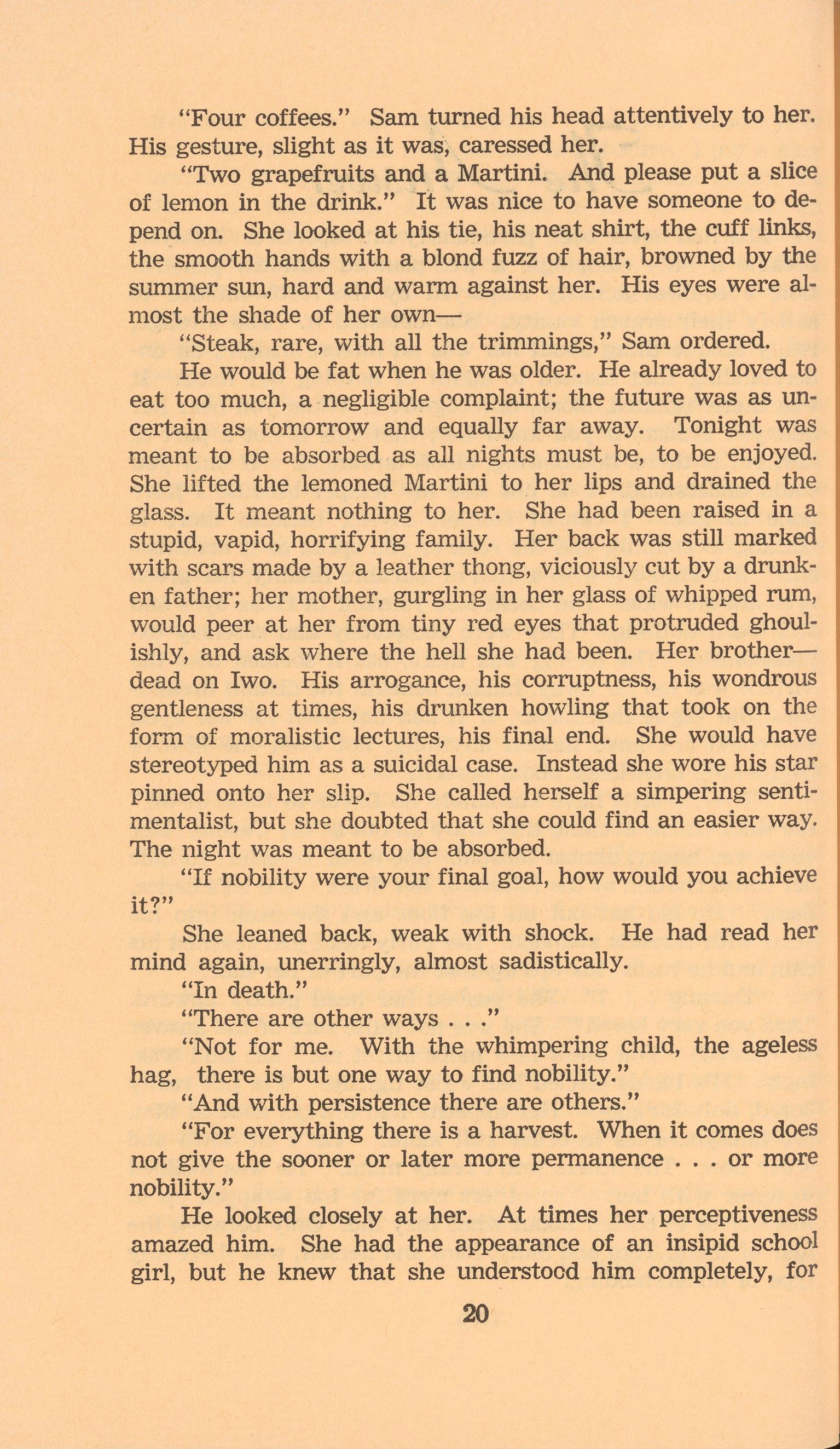
"Four coffees." Sam turned his head attentively to her. His gesture, slight as it was; caressed her.
"Two grapefruits and a Martini. And please put a slice of lemon in the drink." It was nice to have someone to depend on. She looked at his tie, his neat shirt, the cuff links, the smooth hands with a blond fuzz of hair, browned by the summer sun, hard and warm against her. His eyes were almost the shade of her own-
"Steak, rare, with all the trimmings," Sam ordered. He would be fat when he was older. He already loved to eat too much, a negligible complaint; the future was as uncertain as tomorrow and equally far away. Tonight was meant to be absorbed as all nights must be, to be enjoyed. She lifted the lemoned Martini to her lips and drained the glass. It meant nothing to her. She had been raised in a stupid, vapid, horrifying family. Her back was still marked with scars made by a leather thong, viciously cut by a drunken father; her mother, gurgling in her glass of whipped rum , would peer at her from tiny red eyes that protruded ghoulishly, and ask where the hell she had been. Her brotherdead on Iwo. His arrogance, his corruptness, his wondrous gentleness at times, his drunken howling that took on the form of moralistic lectures, his final end. She would have stereotyped him as a suicidal case. Instead she wore his star pinned onto her slip. She called herself a simpering sentimentalist, but she doubted that she could find an easier way. The night was meant to be absorbed.
"If nobility were your final goal, how would you achieve it?"
She leaned back, weak with shock. He had read her mind again, unerringly, almost sadistically.
"In death."
"There are other ways . . ."
"Not for me. With the whimpering child, the ageless hag, there is but one way to find nobility."
"And with persistence there are others."
"For everything there is a harvest. When it comes does not give the sooner or later more permanence . . . or more nobility."
He looked closely at her. At times her perceptiveness amazed him. She had the appearance of an insipid school girl, but he knew that she understood him completely, for 20
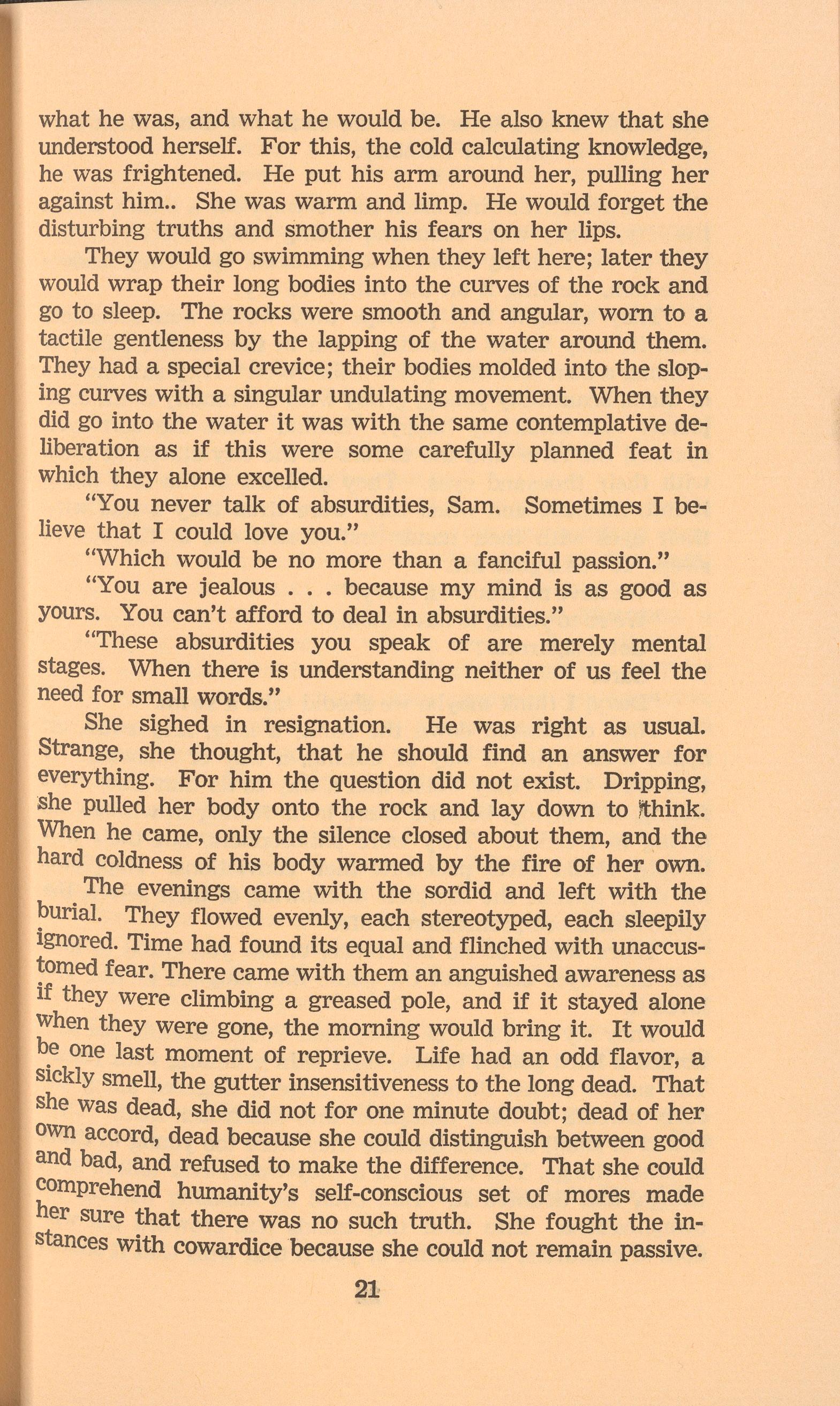
what he was, and what he would be. He also knew that she understood herself. For this, the cold calculating knowledge, he was frightened. He put his arm around her, pulling her against him.. She was warm and limp. He would forget the disturbing truths and smother his fears on her lips.
They would go swimming when they left here; later they would wrap their long bodies into the curves of the rock and go to sleep. The rocks were smooth and angular, worn to a tactile gentleness by the lapping of the water around them. They had a special crevice; their bodies molded into the sloping curves with a singular undulating movement. When they did go into the water it was with the same contemplative deliberation as if this were some carefully planned feat in which they alone excelled.
"You never talk of absurdities, Sam. Sometimes I believe that I could love you."
"Which would be no more than a fanciful passion."
"You are jealous ... because my mind is as good as yours. You can't afford to deal in absurdities."
"These absurdities you speak of are merely mental stages. When there is understanding neither of us feel the need for small words."
She sighed in resignation. He was right as usual. Strange, she thought, that he should find an answer for everything. For him the question did not exist. Dripping, she pulled her body onto the rock and lay down to lthink. When he came, only the silence closed about them, and the hard coldness of his body warmed by the fire of her own.
The evenings came with the sordid and left with the burial. They flowed evenly, each stereotyped, each sleepily ignored. Time had found its equal and flinched with unaccustomed fear. There came with them an anguished awareness as if they were climbing a greased pole, and if it stayed alone When they were gone, the morning would bring it. It would be one last moment of reprieve. Life had an odd flavor, a sickly smell, the gutter insensitiveness to the long dead. That she was dead, she did not for one minute doubt; dead of her own accord, dead because she could distinguish between good and bad, and refused to make the difference. That she could comprehend humanity's self-conscious set of mores made her sure that there was no such truth. She fought the instances with cowardice because she could not remain passive.
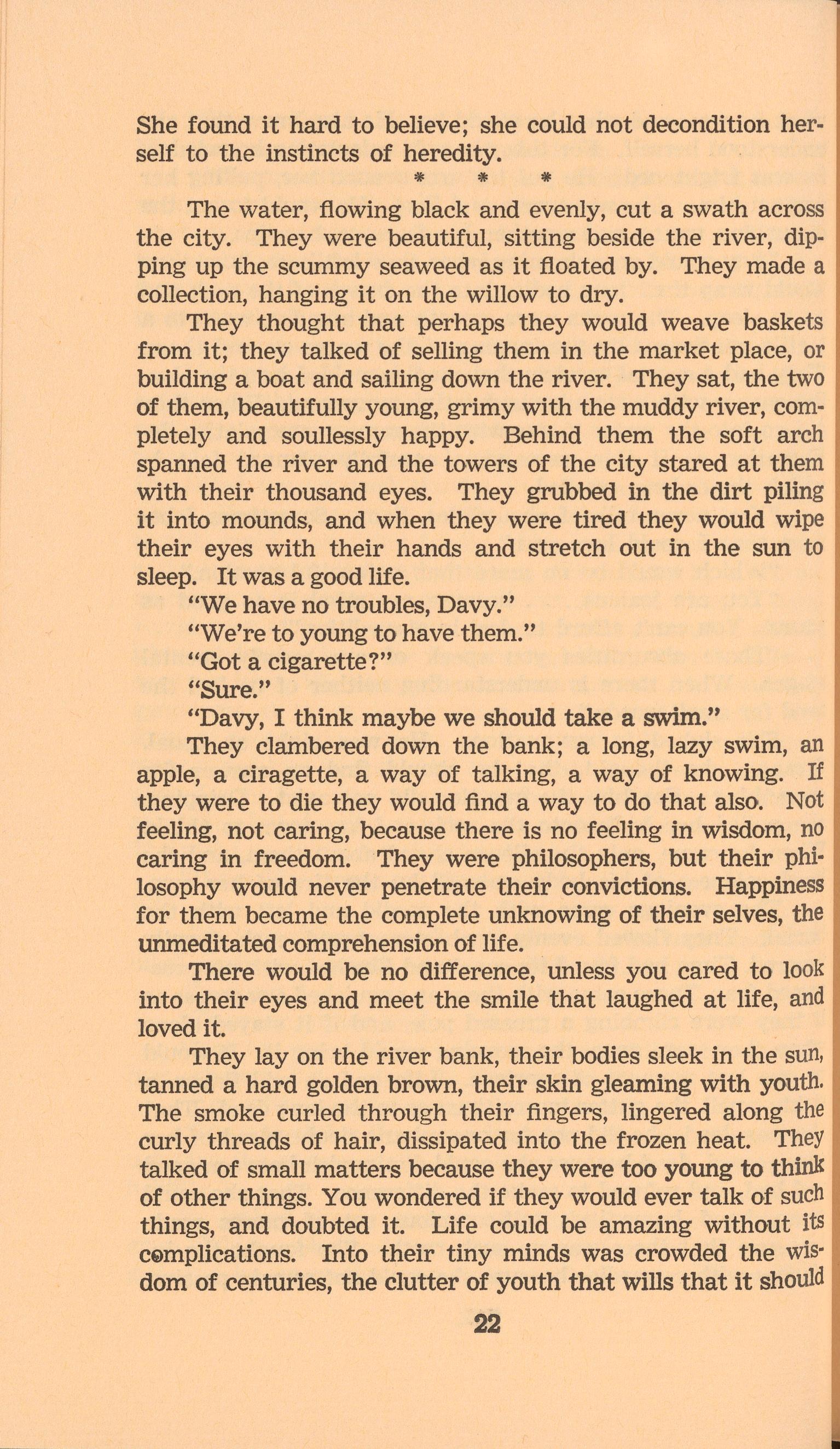
She found it hard to believe; she could not decondition herself to the instincts of heredity.
The water, flowing black and evenly, cut a swath across the city. They were beautiful, sitting beside the river, dipping up the scummy seaweed as it floated by. They made a collection, hanging it on the willow to dry.
They thought that perhaps they would weave baskets from it; they talked of selling them in the market place, or building a boat and sailing down the river. They sat, the two of them, beautifully young, grimy with the muddy river, completely and soullessly happy. Behind them the soft arch spanned the river and the towers of the city stared at them with their thousand eyes. They grubbed in the dirt piling it into mounds, and when they were tired they would wipe their eyes with their hands and stretch out in the sun to sleep. It was a good life.
"We have no troubles, Davy."
"We're to young to have them."
"Got a cigarette?"
"Sure."
"Davy, I think maybe we should take a swim." They clambered down the bank; a long, lazy swim, an apple, a ciragette, a way of talking, a way of knowing. If they were to die they would find a way to do that also. Not feeling, not caring, because there is no feeling in wisdom, no caring in freedom. They were philosophers, but their phi· losophy would never penetrate their convictions. Happiness for them became the complete unknowing of their selves, the unmeditated comprehension of life.
There would be no difference, unless you cared to look into their eyes and meet the smile that laughed at life, and loved it.
They lay on the river bank, their bodies sleek in the sun, tanned a hard golden brown, their skin gleaming with youth, The smoke curled through their fingers, lingered along the curly threads of hair, dissipated into the frozen heat. They talked of small matters because they were too young to think of other things. You wondered if they would ever talk of such things, and doubted it. Life could be amazing without its c0mplications. Into their tiny minds was crowded the wis· dom of centuries, the clutter of youth that wills that it should

remain in the hidden recesses of the mind. Happiness, they contend, is found when life is not distorted by spectres, and they have no cobwebs nor dirty corners to complicate the simplicity of dreams. The sky was silent, speaking no wisdom; the river mumbled its deep-throated words. They must learn from the river, it spoke so that only the young could hear.
They saw her walking slowly along the edge, stepping lazily over the pilings.
"You think she's listening to the river?"
"Naw. The river don't talk to strangers."
The boy turned his head. "She's no stranger. Look at the way she walks. I think she can hear the river."
"Nobody can hear the river but us."
She saw them; folding her skirts, she sat down beside them. There came between them a strange wordless communion. The endings folded themselves into one final fatal breath, because the last was so close, the answer so near. The confused irrelevancies disappeared; a new liberation, a tragically wonderful answer was to come. She waited and talked and looked behind at the illusions, and thoughtfully swept out the corners. When they answered her questions, the answers were already there and she slipped them into the clean spots and stored them. Before life swept in one unveiled gesture like a flick of imitation across a screen. Experience rushed on her in one moment, and the span of years stained her memory and cuddled into the other corners. The knowledge of centuries dissipated itself before the one brilliant light, it was almost too great to pass.
The river became glassy, dull with its turbid greenness. Across the banks, the shadows pushed their lengths to meet and bind the earth. The eyes of the city glowed unexpectantly, winking rakishly at the duo.
"She's a funny one, I say. Who's God anyway?"
"God ain't. You just heard her say there won't no such thing."
Her figure dispelled itself gently into the evening glow. Sam would be pleased that she had found the answer. The simple, uncomplicated answer.
-Mary Elizabeth Hix, '57.

Decision
(Composed after a tryst and a parting) Behold! A light. What) is it green? The gray haze of the night) Lifts slowly from the scene.
-Donald Tillotson,
'57
